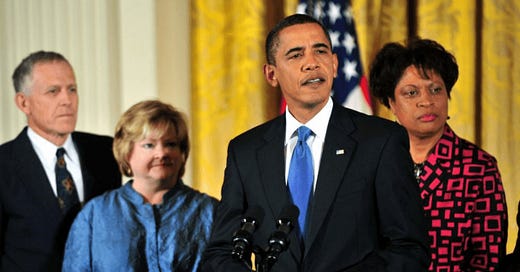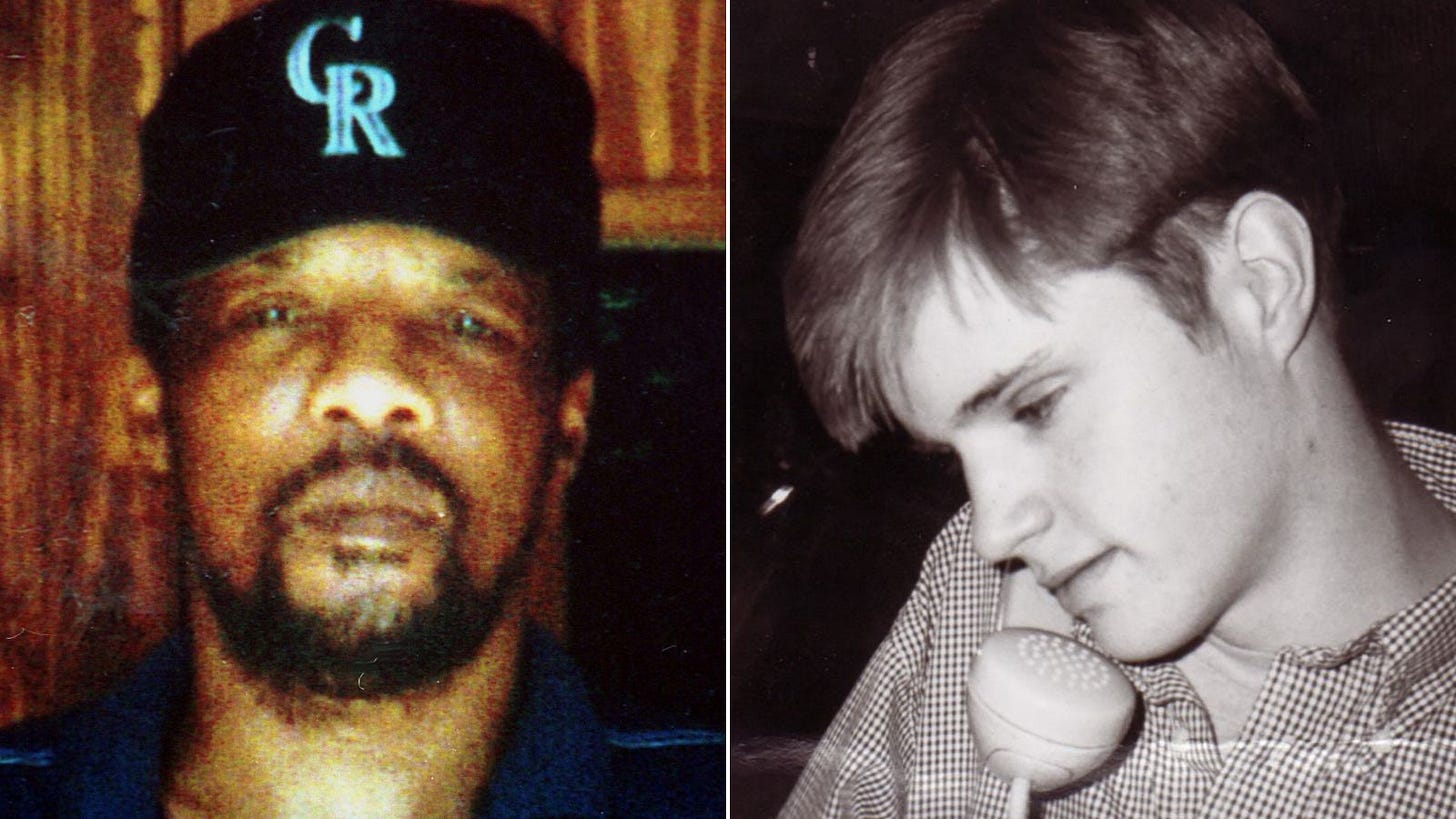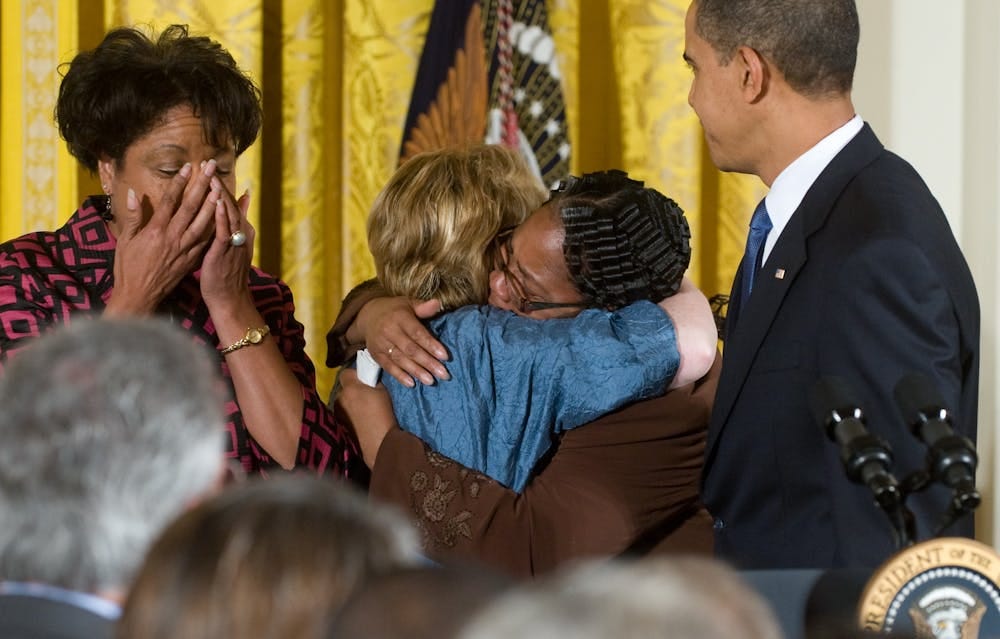The following contains brief descriptions of violent hate crimes against queer people and people of color.
On October 7th, 1998 Matthew Shepard was found comatose and tied to a split rail fence. Eighteen hours earlier, Matthew had hitched a ride with Aaron McKinney and Russell Henderson. They drove out to a remote rural area where the two men beat and pistol whipped Matthew. They stripped him of his shoes and stole his credit card. That same night, McKinney and Henderson had a fight with two local teenagers. They fled when they saw the police approaching, leaving behind McKinney's truck with Matthew’s credit card and a pistol with Matthew’s blood on it.
Before being taken into custody, McKinney allegedly told his girlfriend at the time that he attacked Matthew because Matthew had made a pass at him at the bar, so he and Henderson decided to rob him. Matthew’s death was not the only hate crime committed that year, or even in that week against a gay person, but the martyred image of him tied to the fence, his cross spread like wildfire through the country.
Matthew Shepard’s heart stopped on October 12, 1998. He was 21 years old. The same age I am now.
On June 9th, 1998 a motorist found the decapitated remains of James Byrd Jr. outside an African American Cemetery on Huff Creek Road. Later, police found his head and arm in a roadside ditch. The night before, James Byrd Jr. accepted a ride from Shawn Berry, who he was acquainted with, and Lawrence Brewer, and John King. Instead of taking him home, they drove him to Huff Creek Road. There, they beat him and defecated on him. They then tied him, still alive, to the back of their pickup truck by his ankles and dragged him down the road. He died at some point along the drive. His death is considered to be a modern lynching. The perpetrators even attended a barbeque—which was commonly done after lynchings—right after they had killed Byrd. Brewer and King were known white supremacists and Brewer remained unremorseful about the murder he committed until his death.
James Byrd Jr. died on June 8th, 1998. He was 49 years old. His three children lost their father.
Eleven years after their deaths, The Matthew Shepard and James Byrd Jr. Hate Crimes Prevention Act was signed into law on October 28th 2009 by President Barack Obama. The law expanded the 1969 United States federal hate-crime law to specifically include crimes that were motivated by a victim’s perceived disability, gender identity, and sexual orientation. It also removed the prerequisite that the victim of a hate crime had to be participating in a federal protected activity, and requires the FBI to track hate crime statistics based on gender.
While this blog was made in Matthew’s honor, I believe it's important to recognize that The Matthew Shepard and James Byrd Jr. Hate Crime Prevention Act was named for both Matthew Shepard, a gay man and Jame Byrd Jr., a black man. If we want to put an end to discrimination based violence we must fight to put an end to all discriminatory violence. Our battles as queer people should be fought together with people of color. It is important to understand how intersectional identity affects the discrimination and violence someone faces. For example, black trans women of color are one of the most vulnerable communities to violence.
Almost two decades after Byrd and Shepard were murdered, Willie Jones Jr., a 21 year old black man, was lynched in February of 2018. On August 4th, 2019, Dime Doe, a black transgender woman, was shot and killed. She was 24. Her killer’s trial was the first for a transgender person under The Matthew Shepard and James Byrd Jr. Hate Crimes Prevention Act. On February 23rd, 2020, Ahmaud Arbery, a 25 year old black man was shot and killed while jogging. On December 31st, 2021 Yao Pan Ma, 61 years old chinese man died of wounds sustained from a brutal attack months earlier while he collected cans. On November 19th 2022, Raymond Green Vance, Kelly Loving, Daniel Aston, Derrick Rump, and Ashley Paugh were killed in a shooting at Club Q, a queer bar in Colorado Springs where 19 others were injured. In October 2023, Wadee AlFayoumi, a 6-year-old muslim boy was stabbed to death as he and his mother left their apartment. In July of this year a Venezuelan migrant was shot and killed for sleeping in a park. All of these hate crimes—and alleged hate crimes, are not the only ones that happened in their year. Each of the people above along with many others left unlisted were victims of hatred.
11,862 incidents of hate crimes were reported in 2023 alone affecting 14,416 victims. Most of these incidents did not end in death, but they still were violent either physically and/or psychologically. Hate crimes are also underreported because it is voluntary for many law enforcement agencies to report them. Queer people, people of color, and queer people of color, deserve to live without fear. No one deserves to die for simply existing. No one should ever have to be martyred.
One of the missions of the Matthew Shepard Foundation is to “strengthen[...] hate crimes law and rais[e] awareness of the violence the LGBTQ+ community faced.” The Matthew Shepard Foundation exists because no one else should ever have to experience the pain of losing a child, a parent, a sibling, a friend, prematurely because of something as violent and vicious as the hatred of a fellow man.
The Matthew Shepard and James Byrd Jr. Hate Crimes Prevention Act furthers our ability to call out these violent hate crimes, recognizing them as being done for no other reason than because they do not see their victims as equals.. The road ahead to preventing hate crimes is long. As we fight against this hatred, it's important to recognize we are not simply fighting for our community. If we are community based in love, then our love and compassion must extend to all people. Our love should stand in opposition to all hatred.
About the Author
Anne Gregg is a poet and writer from Northwest Indiana. She is an English Writing major at DePauw University and is the editor-in-chief of her campus’s literary magazine, A Midwestern Review. She is a Media Fellow at her university and loves dissecting how LGBTQ+ people are portrayed in film and tv.







